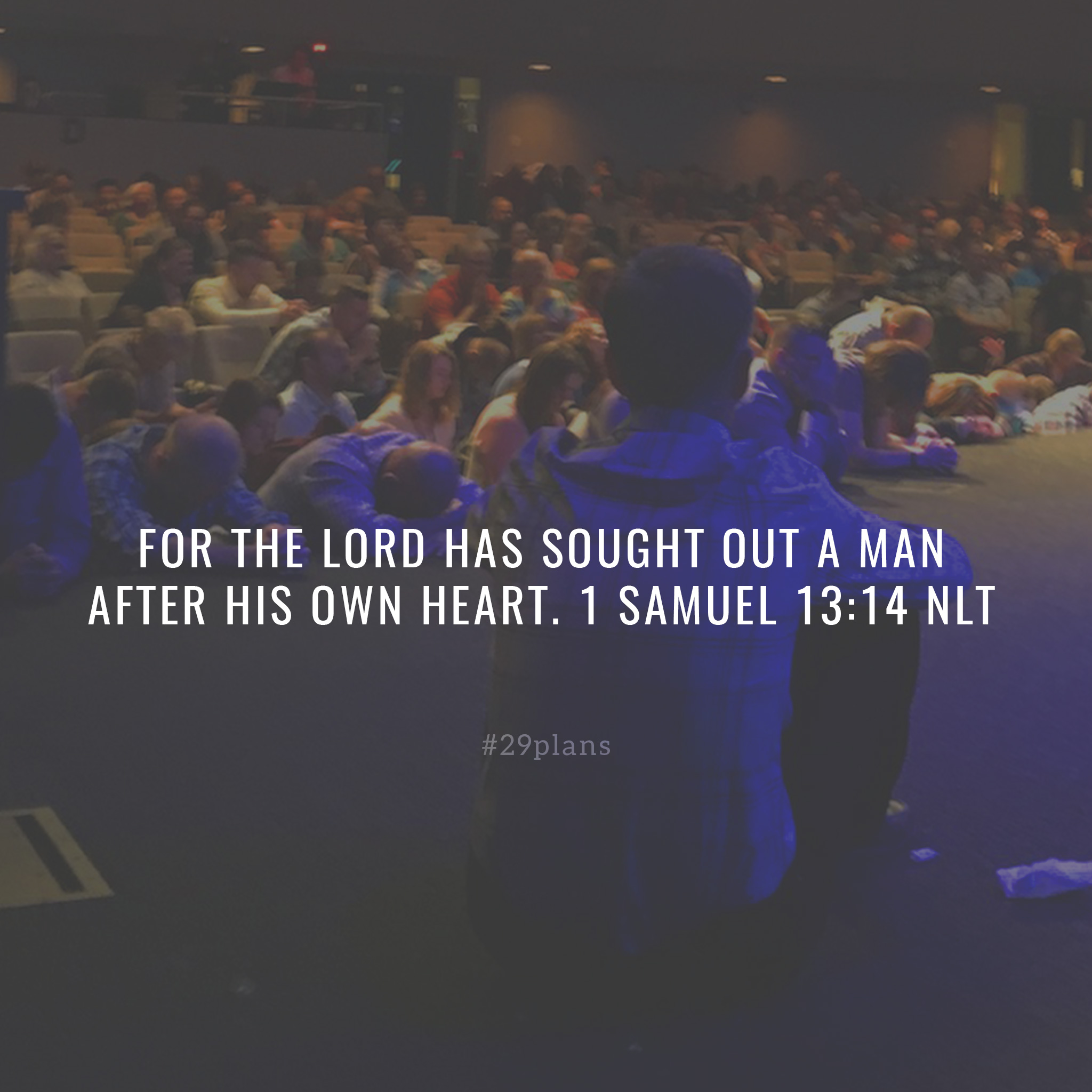Guide: Read 1 Samuel 13; Acts 22:23-23:11; Listen to After Your Heart by @philwickham; Pray for an obedient heart; Why must we obey?
Verse of the Day: For the Lord has sought out a man after his own heart 1 Samuel 13:14 NLT
Song of the Day: After Your Heart by Phil Wickham — Youtube
Bible Reading: 1 Samuel 13; Acts 22:23-23:11
1 Samuel 13
Continued War with Philistia
1 Saul was thirty[a] years old when he became king, and he reigned for forty-two years.[b]
2 Saul selected 3,000 special troops from the army of Israel and sent the rest of the men home. He took 2,000 of the chosen men with him to Micmash and the hill country of Bethel. The other 1,000 went with Saul’s son Jonathan to Gibeah in the land of Benjamin.
3 Soon after this, Jonathan attacked and defeated the garrison of Philistines at Geba. The news spread quickly among the Philistines. So Saul blew the ram’s horn throughout the land, saying, “Hebrews, hear this! Rise up in revolt!” 4 All Israel heard the news that Saul had destroyed the Philistine garrison at Geba and that the Philistines now hated the Israelites more than ever. So the entire Israelite army was summoned to join Saul at Gilgal.
5 The Philistines mustered a mighty army of 3,000[c] chariots, 6,000 charioteers, and as many warriors as the grains of sand on the seashore! They camped at Micmash east of Beth-aven. 6 The men of Israel saw what a tight spot they were in; and because they were hard pressed by the enemy, they tried to hide in caves, thickets, rocks, holes, and cisterns. 7 Some of them crossed the Jordan River and escaped into the land of Gad and Gilead.
Saul’s Disobedience and Samuel’s Rebuke
Meanwhile, Saul stayed at Gilgal, and his men were trembling with fear. 8 Saul waited there seven days for Samuel, as Samuel had instructed him earlier, but Samuel still didn’t come. Saul realized that his troops were rapidly slipping away. 9 So he demanded, “Bring me the burnt offering and the peace offerings!” And Saul sacrificed the burnt offering himself.
10 Just as Saul was finishing with the burnt offering, Samuel arrived. Saul went out to meet and welcome him, 11 but Samuel said, “What is this you have done?”
Saul replied, “I saw my men scattering from me, and you didn’t arrive when you said you would, and the Philistines are at Micmash ready for battle. 12 So I said, ‘The Philistines are ready to march against us at Gilgal, and I haven’t even asked for the Lord’s help!’ So I felt compelled to offer the burnt offering myself before you came.”
13 “How foolish!” Samuel exclaimed. “You have not kept the command the Lord your God gave you. Had you kept it, the Lord would have established your kingdom over Israel forever. 14 But now your kingdom must end, for the Lord has sought out a man after his own heart. The Lord has already appointed him to be the leader of his people, because you have not kept the Lord’s command.”
Israel’s Military Disadvantage
15 Samuel then left Gilgal and went on his way, but the rest of the troops went with Saul to meet the army. They went up from Gilgal to Gibeah in the land of Benjamin.[d] When Saul counted the men who were still with him, he found only 600 were left! 16 Saul and Jonathan and the troops with them were staying at Geba in the land of Benjamin. The Philistines set up their camp at Micmash. 17 Three raiding parties soon left the camp of the Philistines. One went north toward Ophrah in the land of Shual, 18 another went west to Beth-horon, and the third moved toward the border above the valley of Zeboim near the wilderness.
19 There were no blacksmiths in the land of Israel in those days. The Philistines wouldn’t allow them for fear they would make swords and spears for the Hebrews. 20 So whenever the Israelites needed to sharpen their plowshares, picks, axes, or sickles,[e] they had to take them to a Philistine blacksmith. 21 The charges were as follows: a quarter of an ounce[f] of silver for sharpening a plowshare or a pick, and an eighth of an ounce[g] for sharpening an ax or making the point of an ox goad. 22 So on the day of the battle none of the people of Israel had a sword or spear, except for Saul and Jonathan.
23 The pass at Micmash had meanwhile been secured by a contingent of the Philistine army.
–
Footnotes:
- 13:1a As in a few Greek manuscripts; the number is missing in the Hebrew.
- 13:1b Hebrew reigned . . . and two; the number is incomplete in the Hebrew. Compare Acts 13:21.
- 13:5 As in Greek and Syriac versions; Hebrew reads 30,000.
- 13:15 As in Greek version; Hebrew reads Samuel then left Gilgal and went to Gibeah in the land of Benjamin.
- 13:20 As in Greek version; Hebrew reads or plowshares.
- 13:21a Hebrew 1 pim [8 grams].
- 13:21b Hebrew 1⁄3 [of a shekel] [4 grams].
Acts 22:23-23:11
23 They yelled, threw off their coats, and tossed handfuls of dust into the air.
Paul Reveals His Roman Citizenship
24 The commander brought Paul inside and ordered him lashed with whips to make him confess his crime. He wanted to find out why the crowd had become so furious. 25 When they tied Paul down to lash him, Paul said to the officer[a] standing there, “Is it legal for you to whip a Roman citizen who hasn’t even been tried?”
26 When the officer heard this, he went to the commander and asked, “What are you doing? This man is a Roman citizen!”
27 So the commander went over and asked Paul, “Tell me, are you a Roman citizen?”
“Yes, I certainly am,” Paul replied.
28 “I am, too,” the commander muttered, “and it cost me plenty!”
Paul answered, “But I am a citizen by birth!”
29 The soldiers who were about to interrogate Paul quickly withdrew when they heard he was a Roman citizen, and the commander was frightened because he had ordered him bound and whipped.
Paul before the High Council
30 The next day the commander ordered the leading priests into session with the Jewish high council.[b] He wanted to find out what the trouble was all about, so he released Paul to have him stand before them.
1 Gazing intently at the high council,[c] Paul began: “Brothers, I have always lived before God with a clear conscience!”
2 Instantly Ananias the high priest commanded those close to Paul to slap him on the mouth. 3 But Paul said to him, “God will slap you, you corrupt hypocrite![d] What kind of judge are you to break the law yourself by ordering me struck like that?”
4 Those standing near Paul said to him, “Do you dare to insult God’s high priest?”
5 “I’m sorry, brothers. I didn’t realize he was the high priest,” Paul replied, “for the Scriptures say, ‘You must not speak evil of any of your rulers.’[e]”
6 Paul realized that some members of the high council were Sadducees and some were Pharisees, so he shouted, “Brothers, I am a Pharisee, as were my ancestors! And I am on trial because my hope is in the resurrection of the dead!”
7 This divided the council—the Pharisees against the Sadducees— 8 for the Sadducees say there is no resurrection or angels or spirits, but the Pharisees believe in all of these. 9 So there was a great uproar. Some of the teachers of religious law who were Pharisees jumped up and began to argue forcefully. “We see nothing wrong with him,” they shouted. “Perhaps a spirit or an angel spoke to him.” 10 As the conflict grew more violent, the commander was afraid they would tear Paul apart. So he ordered his soldiers to go and rescue him by force and take him back to the fortress.
11 That night the Lord appeared to Paul and said, “Be encouraged, Paul. Just as you have been a witness to me here in Jerusalem, you must preach the Good News in Rome as well.”
–
Footnotes:
- 22:25 Greek the centurion; also in 22:26.
- 22:30 Greek Sanhedrin.
- 23:1 Greek Sanhedrin; also in 23:6, 15, 20, 28.
- 23:3 Greek you whitewashed wall.
- 23:5 Exod 22:28.
Holy Bible. New Living Translation copyright© 1996, 2004, 2007, 2013 by Tyndale House Foundation. Used by permission of Tyndale House Publishers Inc., Carol Stream, Illinois 60188. All rights reserved.



